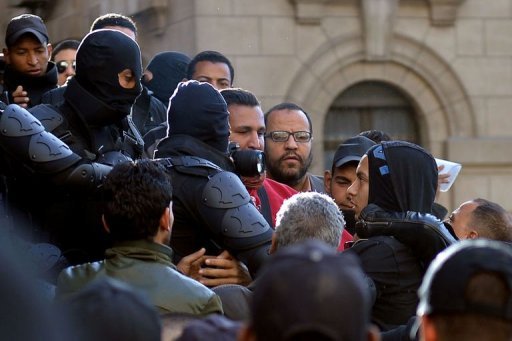CAIRO: Political powers were divided over a decision to bring forward the presidential elections to the end of May instead of the end of June.
Egypt’s Minister of Parliamentary Affairs and Local Development Mohamed Atteya made the announcement in an article published by state owned daily Al-Ahram newspaper on Wednesday.
He said that registration for presidential candidates will start on March 10 and will last for three weeks, and 45 days will be allocated to campaigning.
Strategic expert and former army officer Sameh Seif El-Yazal said that this timeline means that the Supreme Council of Armed Forces (SCAF) would hand over power to the elected president by the end of May.
Last week, Prime Minister Kamal El-Ganzoury said in a press conference that the military council insisted on staying in power until the end of June.
"Once the president is elected, SCAF must hand over power to him immediately and abandon any political role…any other scenario is impossible," El-Yazal told Daily News Egypt.
Political powers agreed, stressing that it was a given that SCAF would step back once a new president is elected.
"The president will assume his duties once he’s elected, and the military council will perform its duty of protecting the country’s borders," spokesperson of the Muslim Brotherhood Mahmoud Ghozlan told DNE.
There has been speculation that SCAF might continue deploying troops around the country amid a gaping security vacuum since police withdrew from the streets on Jan.28, 2011 in the early days of a popular revolt that eventually toppled ex-president Hosni Mubarak.
"The elected president has to officially request that the military forces stay on the streets for that to take place, otherwise the decision would be unconstitutional," said El-Yazal.
Some political powers welcomed the announcement describing it as a "positive step," while others rejected it as "meaningless."
"We support any decision to accelerate handing over power to a civilian authority," said Nader Bakkar spokesman of Al-Nour Party
Al-Wafd Party and the Muslim Brothehrood’s political arm, the Freedom and Justice Party (FJP), said that the constitution had to be written and put to a referendum before the new president is elected.
"[Otherwise] the new president might influence the writing of the constitution to give himself absolute powers like Mubarak and we don’t want this," said Wafiq El-Ghitany, leading member of Al-Wafd.
Bakkar agreed, saying that the processes of electing a president and writing the constitution should be parallel.
Political analyst Hassan Nafaa said that even though time is tight to draft the constitution, it can be done with the determination of the majority which supports it.
Raafat Fouda, constitutional law professor at Cairo University, previously told DNE that the new constitution could be drafted in two weeks, if the process goes smoothly.
"Ideally, the constitution should be drafted before the president is elected in order to give him specific powers … but it doesn’t look like the political powers will agree to this," Nafaa said.
Mohamed Afify, spokesman of the April 6 Youth Movement, downplayed the step, objecting to the fact that the new timeline still means that the constitution will be drafted under military rule.
"SCAF can manipulate the writing of the constitution to give itself special benefits. We want a constitution that represents the people without the influence of any authority," Afify said.
Karima El-Hifnawy, secretary general of the Egyptian Social Democratic Party and leading member of the Kefaya Movement for Change, echoed Afify’s sentiment, stressing that SCAF must eave immediately.
"SCAF cannot be trusted to continue ruling the country for one more day," El-Hifnawy said.
April 6 and El-Hifnawy participated in mass protests in the past weeks, calling on SCAF to hand over power immediately to a civilian authority.
It is believed that these protests along with the People’s Assembly (PA) pressured SCAF to move up the presidential elections.
"The military council doesn’t move without pressure," said Ghozlan.
Speaker of the PA, Saad El-Katatny held a closed meeting with head of SCAF Field Marshal Hussein Tantawi and other MPs and SCAF generals on Tuesday to discuss the current situation in Egypt, including the timeline for their exit from power.
The Shoura Council (Upper House of Parliament) will be seated on Feb. 28.
The parliament will then select the 100-strong constituent assembly tasked with drafting the constitution.
Both Al-Nour and the Freedom and Justice Party (FJP) — who hold around 72 percent of the PA seats — said that they opt for a semi-presidential political system.
"We will try to implement the semi-presidential system in the new constitution," said Bakkar.
FJP MP in Suez Ahmed Mohamed said that despite the fact that the FJP’s program propagated a parliamentary system, the FJP chose to support a semi-presidential system agreed upon by the majority of political powers.

